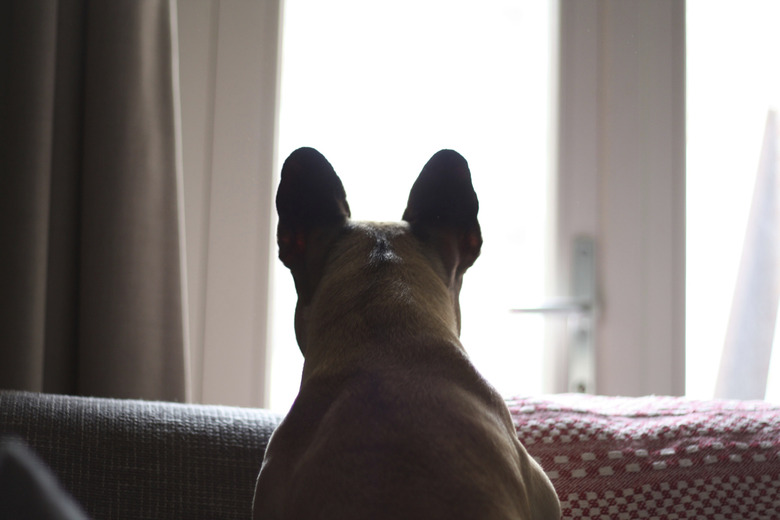How To Help A Dog Who Lost His Companion To Death
Sorrow over the death of a companion is a natural emotion for anyone, even dogs. According to Dr. Sophia Yin, a veterinarian and applied animal behaviorist, in an interview with U.S. News and World Report, grief is among the basic emotions dogs are capable of feeling. Every dog is unique, however, so each one will react to the death of a loved one differently. As with humans, all you can do is be there for them, offering comfort, support and love.
Symptoms of Grief
Symptoms of Grief
Just like humans, some dogs seem to deal with grief stoically while others have a hard time coping. In her article for Prevention, Dr. Justine Lee, author and veterinarian, describes dogs' grief symptoms as very similar to what grieving humans experience: loss of appetite, sleeping more or less than usual, lethargy, insecurity or clinginess. Personality changes may occur, too, causing a normally sweet and even-tempered dog to become irritable and nippy. Some dogs howl or vocalize their grief in other ways, and some even begin eliminating in the house.
Helping With the Grieving Process
Helping With the Grieving Process
Whether your dog is coping with the loss of a human or animal companion, the steps you can take to help him through it are the same. Be patient and compassionate with him. Keep his routine essentially the same. Dinner time, bed time and potty breaks should remain unchanged, but spend more quality time with him. Cuddle, take walks or play fetch or another favorite game. Try to eliminate stress by not making significant changes to your dog's environment, if possible. That means it's OK to leave his companion's belongings in place, such as a human's clothing or other animal's bed and toys. If your dog loses his appetite, don't use human food to try to coax him to eat, but do offer him his favorite dog treats to spark his desire to eat. In her article for Veterinary Partner, author and trainer Kathy Diamond Davis recommends positive training for dogs who are grieving. Whether you and your dog attend a class or obtain private instruction, training will give your dog an enjoyable activity to focus on.
Filling the Void
Filling the Void
If your dog is left as an only "child" after the death of his animal companion, you might be tempted to adopt another pet into the family to fill the void. However, it's best to put those plans off for a few months. According to Dr. Kathleen Cooney of the Loveland, Colo., in-home pet hospice and euthanasia clinic Home to Heaven, adding a new pet to the household immediately will stress your dog. A younger pet, such as a puppy or kitten, may be too hyperactive and demanding, while an older pet might make your dog feel that it's necessary to compete for your attention and his place in the social order. Wait two or three months before you even start looking. That will give your dog time to adjust to the loss of his buddy.
Keep a Watchful Eye
Keep a Watchful Eye
Not every dog will work through grief in the same amount of time. Some may start to come out of it after a week or two, and others may take months before they begin to act like themselves again. Because some of the symptoms of grief, such as loss of appetite and trouble sleeping, can affect your dog's health, don't let them go on for more than a few weeks without seeking medical help. It could simply be the heartache he's feeling, but there's always the chance that there may be more to it than grief. There could be an underlying medical issue that coincided with the loss of a loved one, or it may have been there all along and was aggravated and revealed because of the stress your dog is going through. If he loses weight, seems weak or his health in general appears to be declining, take him to the vet.
